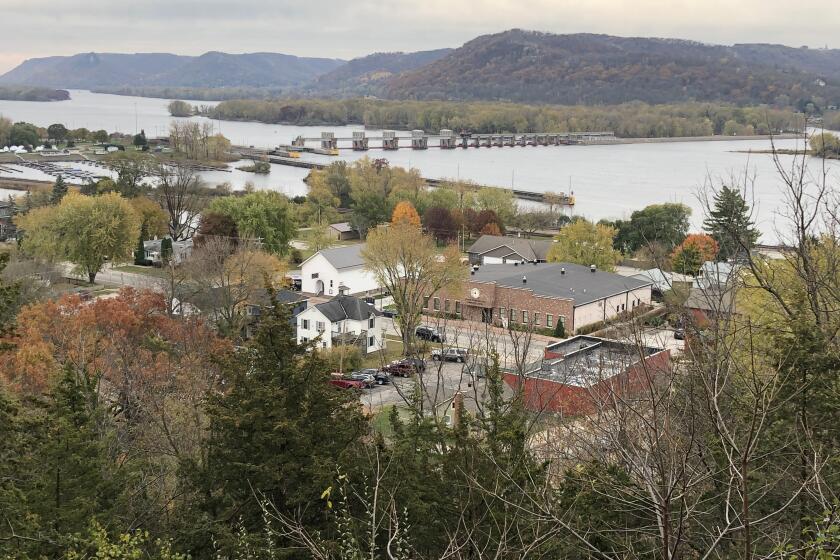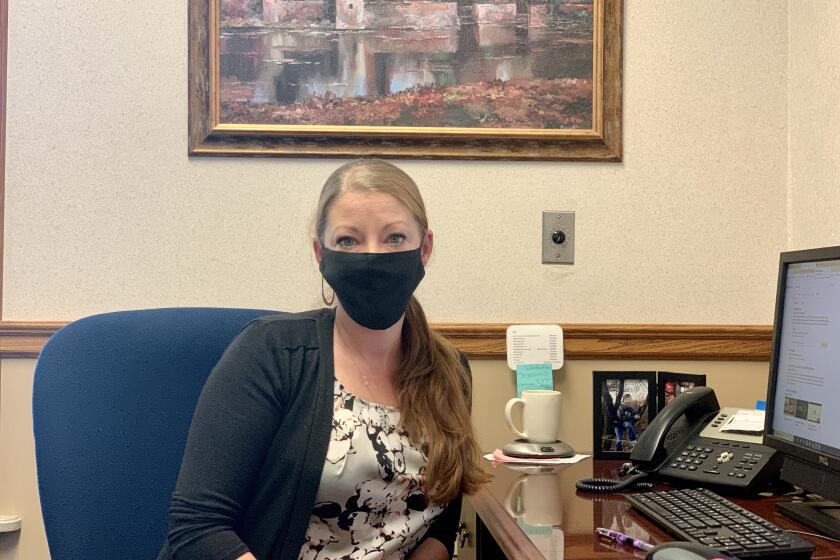Politics and pandemic collide in a tiny red state: Masks? What masks?
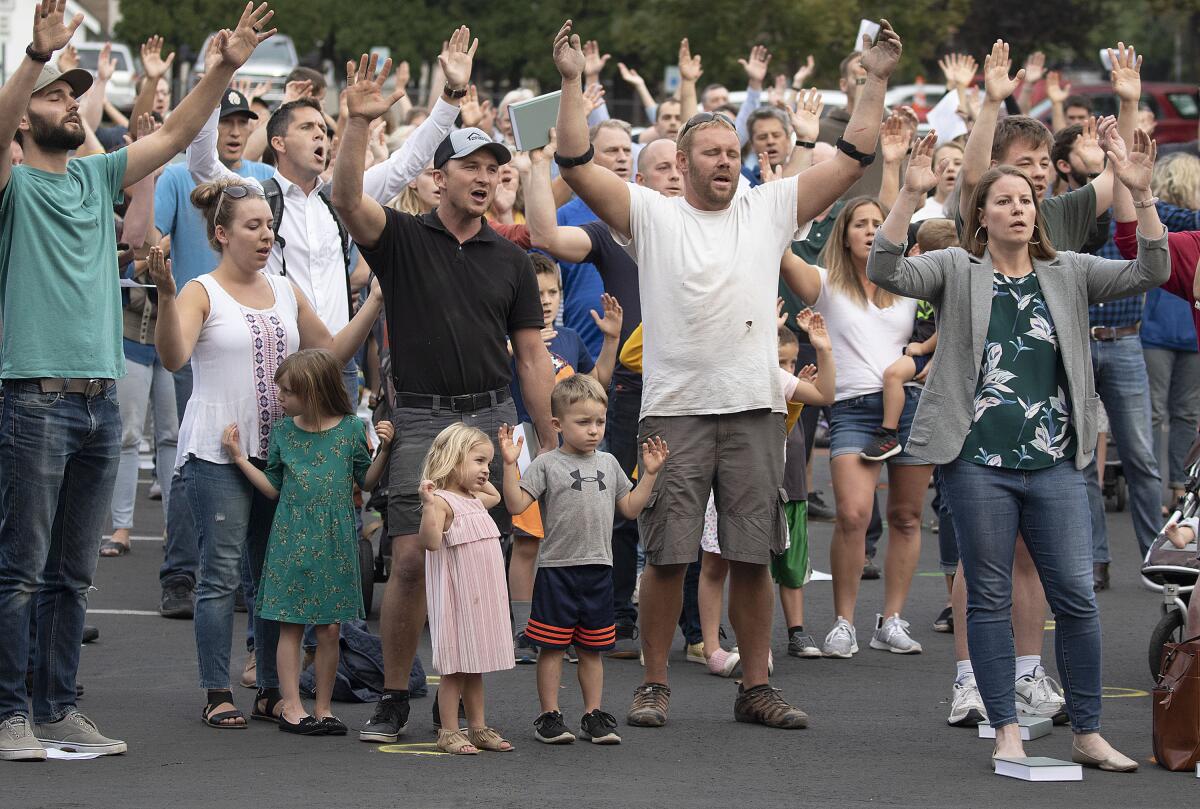
Boise, Idaho — This is what life is like in a deep-red state during a global pandemic in the final days of the ugliest presidential campaign in modern history.
Saturday, Oct. 24: At a rally for President Trump on the steps of the state Capitol, none of the cheering, praying Republicans wears a mask. There is no mention of the virus, although state Rep. Tammy Nichols assures the faithful that “Idaho’s going to go for Trump.” The state breaks its record for an important COVID-19 metric — the seven-day average number of cases. It is the eighth time that record has shattered in as many days.
Monday: Gov. Brad Little announces tightened restrictions to battle the virus. Sort of. “It doesn’t mean our economy is on lockdown,” the Republican assures constituents. “It doesn’t mean in-person church will end.... It especially doesn’t mean that we should go to full remote learning in our schools.”
Tuesday: Lt. Gov. Janice McGeachin headlines a video posted by the Idaho Freedom Foundation decrying Little’s restrictions and questioning whether the deadly virus even exists. The deeply conservative Republican smiles from the driver’s seat of a flag-draped truck. She brandishes a Bible and a gun.
McGeachin is joined on the video by eight legislators and two Republican candidates running unopposed as they announce the foundation’s “Declaration to Idaho residents and public officials.”
“We demand an end to the emergency orders issued by state and local government officials,” intones state Rep. Tony Wisniewski. “Any order issued in the future will be ignored,” says Rep. Heather Scott.
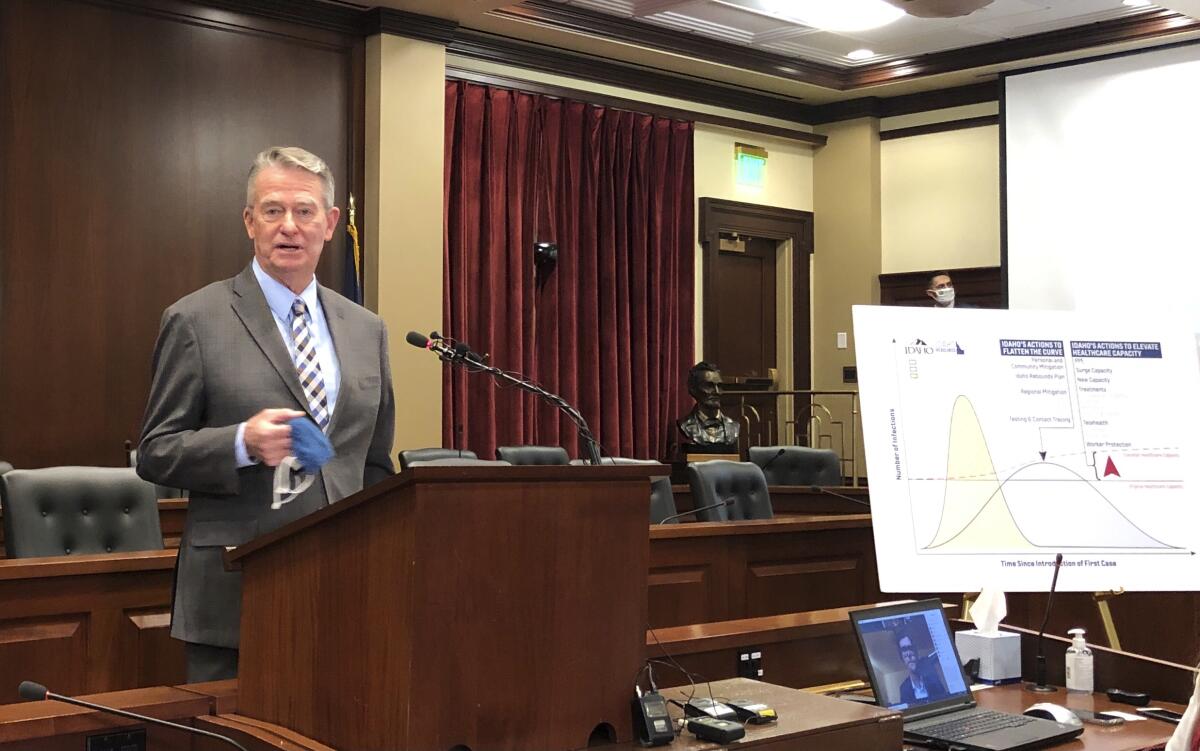
Wednesday: “COVID-19 hospitalizations in Idaho reach all-time high,” the Idaho Statesman announces in a breaking email alert. But on this day, there is another staggering statistic. In Ada County — home to Boise, and the population center of this largely rural state — 82% of the ballots issued via absentee or early voting have been returned.
Idaho is no battleground state, no darling of presidential candidates angling for the Oval Office. It’s tiny, with just four electoral votes and around 1.8 million people (California has 55 of the first and around 39.5 million of the second). The last time Idaho went for a Democrat for president was 1964, when Lyndon B. Johnson beat Barry Goldwater.
Presidential candidates steer clear of the Gem State during general election season; Democrats don’t stand a chance, and Republicans don’t need to bother. If Idaho is a bellwether of anything, it would be Republican fervor and leave-me-alone independence. Both of those have been on prominent display as politics and pandemic collide in the waning days of campaign 2020.
Still, it is possible, here in the Idaho state capital, to believe the two-party political system is alive and well.
You can buy an Elizabeth Warren action figure at Flying M Coffee House across the street from City Hall, along with a black knit cap that proclaims you a proud “Idahomo” in bright white letters. Signs reading “Grab him by the ballot” and “We believe black lives matter, no human is illegal, love is love,” decorate frontyards in the Hyde Park neighborhood.
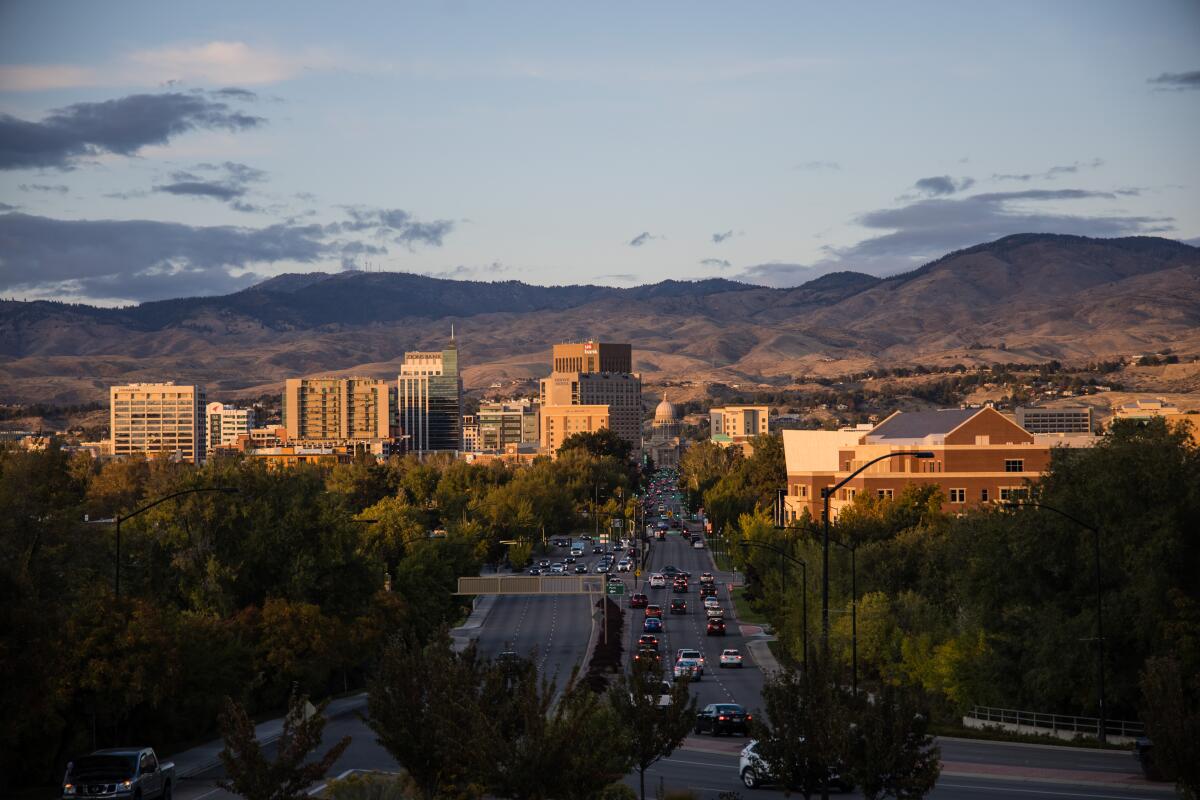
Demonstrators calling for equality and justice have lined State Street near the Capitol since George Floyd was killed by police in Minneapolis; they plan to continue their lunch-hour protests “for American values” until election day has come and gone. A Democratic mayor has been in charge for nearly 17 years. Thousands of hardy souls made their way through thick, wet snowfall here during the 2017 Women’s March protesting Trump’s inauguration.
But the farther you get from the Capitol dome, the redder the state becomes.
Go about 100 miles east of Boise, and you’ll find Hailey, Idaho, where Republican Eric Parker is running for the state senate. The 36-year-old electrician is the leader of a militia group called the Real 3% of Idaho. A photograph of Parker pointing a rifle at federal law enforcement officials from a freeway overpass is an enduring image of the 2014 armed standoff at the Bundy ranch in Nevada.
Wisconsin’s small towns on the Mississippi River backed Trump in 2016, but a COVID-19 surge is boosting support for Biden in a rural region that twice backed Obama.
Nearly 300 miles north of Boise in Hayden, Idaho, the Panhandle Health District board wrangled Oct. 23 over the mask mandate in Kootenai County. Board members heard impassioned pleas from local healthcare providers and dire warnings from the district’s own epidemiologist, Jeffrey Lee, about COVID-19, which is caused by SARS-CoV-2, the novel coronavirus.
“As we increase the number of cases, it is not hard to imagine that we will quickly outstrip our hospitals’ capability of meeting that increase in cases,” Lee said. Kootenai Health, a major hospital in the region, was 99% full, the board was told.
Health board member Glen Bailey posited that the pandemic in the state’s sparsely populated northern counties “is decreasing in mortality.”
Lee responded: “No sir, that’s incorrect.”
Hayden resident Sandy White insisted that “we’ve had many more deaths from the flu every year than we’ve had from COVID so far, and that hasn’t led to our needing to wear a mask.”
Lee responded: “No, that’s incorrect, ma’am.… The five northern counties, over four flu seasons, we had 56 deaths. We’ve had 73 deaths in the basically seven months that we’ve had SARS-CoV-2 in the northern counties.”
White shot back: “Were they already terminally ill when they got COVID and they died?”
Ultimately, the board voted 4 to 3 to repeal the county’s mask mandate at the meeting just 11 days before the election. Board member Walt Kirby, who said he wears a mask when he’s out and about and keeps careful social distance, voted in favor of the repeal.
“Nobody’s wearing the damned masks anyway,” said the 90-year-old. “All they are is just thumbing their noses at us anyway. It’s about over. People are dying, they’re going to keep dying, they’re going to keep catching this stuff, and they’re going to keep giving it to one another …
“I’m just sitting back and watching them catch it and die,” he said. “ Hopefully I’ll live through it.”
On Wednesday night, the Ada County Republicans took over the White Theater in Boise’s Overland Park Cinemas. It was movie night, a mixer for the hard-core. Action thriller “Tenet” had been cancelled, replaced for one night only by the new documentary “The Plot Against the President.”
For all the talk of hidden Trump support — what the president likes to call a “silent majority” — there are also Biden backers preferring to keep it quiet.
If you haven’t seen it yet, that’s the one featuring Rep. Devin Nunes (R-Tulare) and exploring the “slow-moving coup engineered by a coterie of the American establishment elite, targeting not only the president, but the whole country.” It’s about Trump. And 2016. And Russia. Spoiler alert: Hillary Clinton doesn’t come off too well.
Victor Miller, chairman of the Ada County Republicans, was the night’s emcee. He declined to comment for this article. But 60-something sisters Maggie Robison of Kuna, Idaho, and Terry Evans of Pahrump, Nev., were only too happy to chat about their favorite presidential candidate.
“I’ve never seen a man work as hard as this president,” Robison said before the movie began. “He really cares about us.” If he loses the election, she said, she fears the Democrats will pack the U.S. Supreme Court, add two new states to the current 50 and attack the Constitution.
On the other hand, she said, she’s not too worried: “It’s going to be another 2016.”
So, were they looking forward to seeing “Plot”? They smiled a little sheepishly. Robison clutched a red, white and blue Trump banner. They were actually heading home. They’d planned to attend the Republican movie night and check out the film. Instead, they took in “Honest Thief.”
“I said, ‘Hey, Liam Neeson is in this other movie,’” Evans recounted. “And I really like Liam Neeson.”
More to Read
Get the L.A. Times Politics newsletter
Deeply reported insights into legislation, politics and policy from Sacramento, Washington and beyond. In your inbox three times per week.
You may occasionally receive promotional content from the Los Angeles Times.
